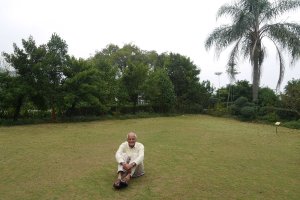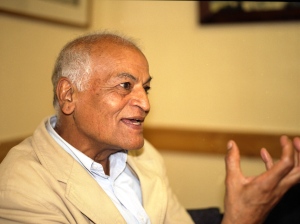I was honoured and privileged in early December 2014 to participate in an interview with Satish Kumar. Satish is the editor of Resurgence & Ecologist magazine, and founder of the Schumacher College in Devon, U.K. A lifelong peace and environmental activist and a former Jain monk, Satish’s most notable activist accomplishment to date is likely to be the “peace walk” he undertook with friend, EP Menon, in 1962. Inspired by the then ninety-two year old Bertrand Russell’s civil disobedience action against the atomic bomb, the two men planned a walk that would take them through the capital cities of the nuclear world: Moscow, Paris, London and Washington D.C.
Beginning in India, the two men walked through Pakistan, Afghanistan, Iran, Armenia, Georgia, the Caucasus Mountains and the Khyber Pass. They eventually accomplished their mission after two-and-a-half-years, meeting Bertrand Russell in London and Martin Luther King Jr. in D.C., as well as countless other kind souls along the way. The prevalence of the latter was instrumental, for one condition under which their journey was conducted was to be without money wherever they walked.
Satish was visiting Hong Kong to conduct a series of week-long workshops. His interview was timely, since it quickly became apparent that its contents were immediately relevant to our concerns about “good life”. Some of the subjects Satish touched upon included developmentalism, industrialisation, economic growth, profits, nature, alienation etc., subjects apparently central to any consideration of the “good life”.
I reproduce here, in two installments, an edited and thematic transcript of the interview. The entry below is the first. Former students in my Political Economy class of Fall 2008 at the University of Oregon, might recall the text, Small is Beautiful, by non-orthodox economist, E.F. Schumacher. The book was the source of many inspirational discussions in class at the time; students might be pleased to see its relevance being invoked by Satish again below.
Small Is Still Beautiful
Satish Kumar began by explaining that his workshop was titled “Small is Beautiful in HK” because everything in HK appeared to be getting too big.
“Hong Kong used to have 4 million people when I came a few years ago but there are now 7 million people. It’s not only the number of people, but everywhere there are big banks, schools, universities, hospitals, shopping malls. What is getting lost is human contact.”
“When institutions get very big, they lose the human touch and lose sight of human relationships. The institution becomes a machine and human beings become cogs in that machine. I want organizations to be small so that human can interact and work together.
They can improvise, use their creativity and spontaneity. This is only possible when organizations are small and people can communicate with one another face-to-face.”
“To me things in Hong Kong have become too big. And, clearly, not just Hong Kong; the situation is the same in China, in India, in the USA, etcetera.”

Buddhist Economics: Economics Where People and Morality Matter
“When E.F. Schumacher wrote Small Is Beautiful in early 1973, his inspiration came from Buddhism. There’s a chapter in the book entitled, “Buddhist Economics”. For Schumacher, Buddhist Economics meant human economics; it is a moral economics, a spiritual economics.”
“People used to ask him what the relevance of Buddhism or morality was to Economics, since the latter was about money, land and resources. Schumacher used to respond: Economics without moral, spiritual, Buddhist, principles is like a flower without fragrance. The flower might look good but it has no fragrance.”
“So, the economy needs human, spiritual, ecological values; Buddhist economics implies a practice of economics based on a system of higher values than just greed and the accumulation of material possessions.”
“Small Is Beautiful came out in 1973. At the time, Schumacher said: unless we remain human, maintain our humanity and stress an economics in which people mattered, people would become an instrument of making profit for the companies. Clearly, this situation has since only become worse.”
“Today people have value only in relation to the profits they make for their companies.
In our subconscious, people have no value if they don’t make profits for their company; they are sacked and asked to “go”. Profits have become the master, and people, the servants. When Schumacher wrote the book in 1973, and when I promoted it, our aim was to make people the masters, and profits, the servant.”
The Central Challenges of Our Times: Developmentalism and Anthropocentrism
Satish argues that the central challenges that stand in our way of moving towards an economics “where people matter” are twofold.
“First, our civilisation has come to believe that working on the land, working with our hands, is a kind of backwardness. Development means that everything should be done by machine. So, we are mechanizing our food production, the production of our clothes, shoes, furniture, buildings etcetera. Here’s the problem: When we’re alienated from nature, and alienated from our hands, we lose contact with the earth and with nature.
So, nature becomes a ‘resource for profit’ rather than a ‘source for life’.”
Note the important distinction between being ‘a resource for economy’ as opposed to being ‘a source for life’.”
“Here’s the problematic mindset brought upon by the industrial revolution: that everything ought to be mechanised. Working by hand is bad; it is a sign of backwardness and done only if you’re uneducated, poor, a peasant, and from the village. But if you’re educated, intelligent, advanced and developed, your hands are believed useful only to work with computers, and maybe not even that. So, the one dominant idea that hampers our way of thinking and doing resides in the notion that everything has to be industrialized.”
“There’s a second difficulty, and it lies in the belief that nature-out-there is not only a resource for the economy but also that it exists only for the benefit of human beings.
This is based on the view that humans are the superior species; all other species exist only for use of human kind. This paradigm thus consists of our separation from nature and the use of nature only for human benefit. Every major institution in our society subscribes to that view: university, school, government, media and business.”
“We need to shift that idea. We need to see that nature has intrinsic value; that nature is good in itself. Therefore, we are nature, as much as trees, forests, rivers and mountains are nature. We are all part of one earth.”
“If we can have such a new paradigm, we will take care of nature. And if we take care of nature, nature will take care of us. The lack of this nature-centred consciousness is the other great difficulty humanity faces.”
